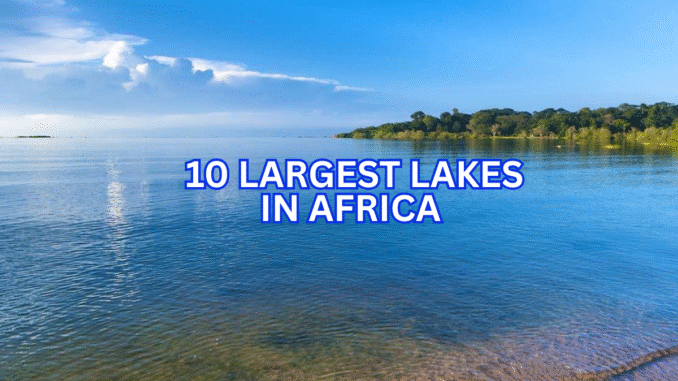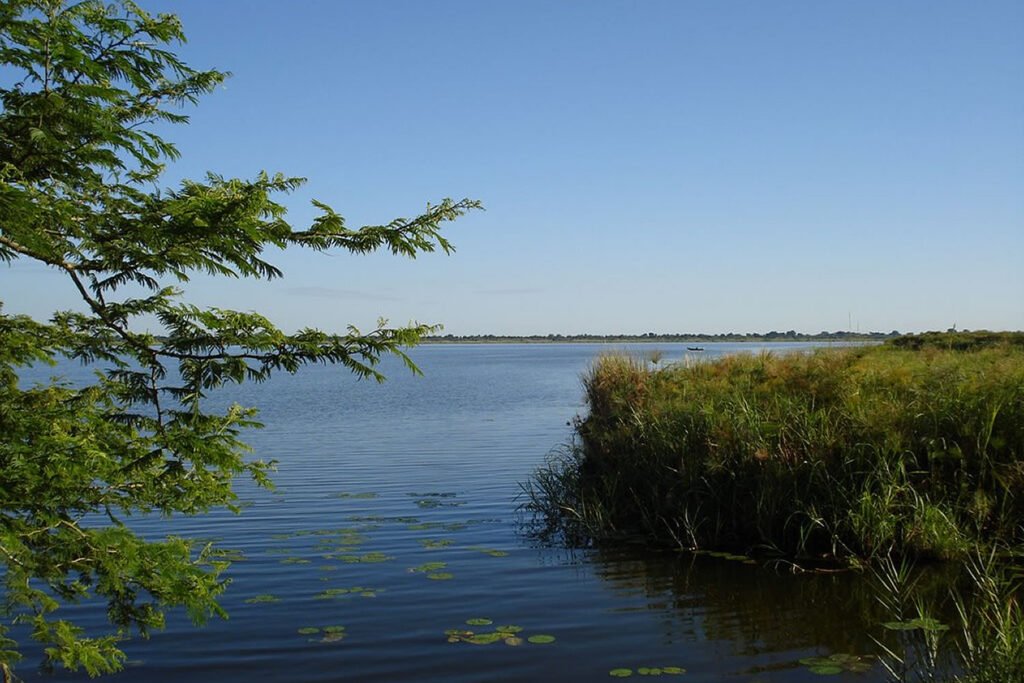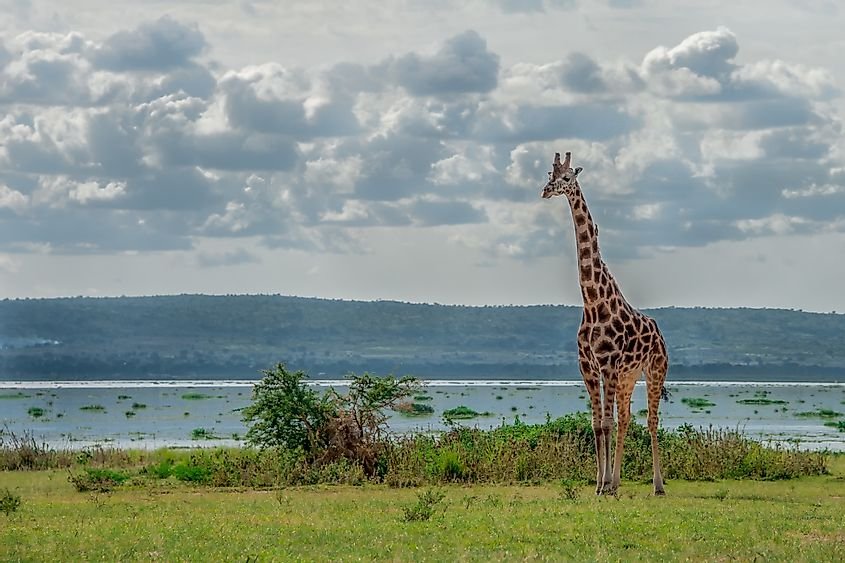
Africa is a land of amazing nature. It has deserts, forests, mountains, rivers, and beautiful lakes. Lakes are large bodies of water surrounded by land. They help people with fishing, farming, drinking water, and transportation. In this article, we will look at the top 10 largest lakes in Africa, their sizes, locations, and interesting facts about each one.
Let’s see them one by one, starting from the largest.
Contents
10. Lake Kyoga
- Area: 1,720 square kilometers
- Country: Uganda
Lake Kyoga is a shallow lake located in the center of Uganda. It is part of the Nile system.
Interesting Facts:
- It gets water from Lake Victoria through the Victoria Nile.
- It has many wetlands and floating plants.
- Fishing is important here, especially for tilapia.
9. Lake Edward
- Area: 2,325 square kilometers
- Countries: Uganda, Democratic Republic of Congo
Lake Edward is located in the Albertine Rift. It is a smaller lake but still among the top 10.
Interesting Facts:
- It connects with Lake George through the Kazinga Channel.
- It is rich in fish and supports nearby communities.
- The lake lies within Queen Elizabeth National Park, a major wildlife area.
8. Lake Kivu
- Area: 2,700 square kilometers
- Countries: Rwanda, Democratic Republic of Congo
Lake Kivu is a special lake in the East African Rift Valley. Hills and mountains surround it.
Interesting Facts:
- It has natural gas under the lakebed.
- It is one of the few “exploding lakes” due to gases trapped in the water.
- It is very scenic and a popular tourist spot.
7. Lake Rukwa
- Area: 5,760 square kilometers (varies with season)
- Country: Tanzania
Lake Rukwa is located in southwest Tanzania. Its size changes with the rainy and dry seasons.
Interesting Facts:
- It is a shallow lake.
- Birds, hippos, and crocodiles live around the lake.
- It is not as popular for tourism but still important for wildlife.
See>>> 10 Longest Rivers in Africa
6. Lake Mweru
- Area: 5,120 square kilometers
- Countries: Zambia, Democratic Republic of Congo
Lake Mweru is located in central Africa and gets water from the Luapula River.
Interesting Facts:
- The name “Mweru” means “lake” in some local languages.
- It is not very deep but still large in size.
- Fishing is common here, and the lake also supports farming.
5. Lake Albert
- Area: 5,300 square kilometers
- Countries: Uganda, Democratic Republic of Congo
Lake Albert is part of the Nile River system. It is one of the African Great Lakes.
Interesting Facts:
- It connects the Victoria Nile and the Albert Nile.
- It is important for fishing and transportation.
- Oil has been found near the lake, bringing economic hope to the region.
4. Lake Turkana
- Area: 6,405 square kilometers
- Countries: Kenya, Ethiopia (partly)
Lake Turkana is the largest desert lake in the world. It is located in a dry area in northern Kenya.
Interesting Facts:
- It is also called the “Jade Sea” because of its green-blue color.
- It has crocodiles, hippos, and many birds.
- The area around the lake has ancient fossils, helping scientists study early humans.
3. Lake Malawi (Lake Nyasa)
- Area: 29,600 square kilometers
- Countries: Malawi, Mozambique, Tanzania
Lake Malawi, also called Lake Nyasa, is the third-largest lake in Africa. It is also one of the deepest.
Interesting Facts:
- It has more types of fish than any other lake in the world.
- It is very clear and beautiful, attracting tourists.
- The lake is important for the people who live near it for fishing and farming.
2. Lake Tanganyika
- Area: 32,900 square kilometers
- Countries: Tanzania, Democratic Republic of Congo, Burundi, Zambia
Lake Tanganyika is the second-largest lake in Africa and the longest freshwater lake in the world. It is also the deepest lake in Africa.
Interesting Facts:
- It has over 300 species of fish found nowhere else in the world.
- The lake is used for transport, fishing, and tourism.
- It is very old, possibly millions of years old.
1. Lake Victoria
- Area: 68,800 square kilometers
- Countries: Tanzania, Uganda, Kenya
Lake Victoria is the largest lake in Africa. It is also the second-largest freshwater lake in the world by surface area, after Lake Superior in North America. It was named after Queen Victoria by British explorer John Speke.
Interesting Facts:
- It is the main source of the White Nile River.
- Millions of people live around Lake Victoria.
- Fishing, especially Nile perch, is very important here.
- It has many islands, including Ukerewe, which is the largest inland island in Africa.
Importance of Lakes in Africa
Lakes in Africa are very important for:
- Fishing: Many people get their food and income from fishing.
- Transport: Boats move people and goods across lakes.
- Farming: Water from lakes helps to grow crops.
- Drinking Water: Some towns and cities get drinking water from lakes.
- Tourism: Tourists visit lakes for their beauty, birds, and boat rides.
- Wildlife: Many animals live in or near lakes, including fish, birds, hippos, and crocodiles.
Quick Summary Table on the Largest Lakes in Africa
| Rank | Lake Name | Size (km²) | Countries Shared |
|---|---|---|---|
| 10 | Lake Kyoga | 1,720 | Uganda |
| 9 | Lake Edward | 2,325 | Uganda, DRC |
| 8 | Lake Kivu | 2,700 | Rwanda, DRC |
| 7 | Lake Mweru | 5,120 | Zambia, DRC |
| 6 | Lake Rukwa | 5,760 | Tanzania |
| 5 | Lake Albert | 5,300 | Uganda, DRC |
| 4 | Lake Turkana | 6,405 | Kenya, Ethiopia |
| 3 | Lake Malawi | 29,600 | Malawi, Mozambique, Tanzania |
| 2 | Lake Tanganyika | 32,900 | Tanzania, DRC, Burundi, Zambia |
| 1 | Lake Victoria | 68,800 | Tanzania, Uganda, Kenya |
Frequently Asked Questions (FAQs)
What is the largest lake in Africa?
The largest lake in Africa is Lake Victoria, with a surface area of about 68,800 square kilometers. It is shared by Tanzania, Uganda, and Kenya.
Which lake is the deepest in Africa?
Lake Tanganyika is the deepest lake in Africa and the second-deepest in the world. It reaches a depth of about 1,470 meters.
What is the importance of lakes in Africa?
Lakes are important for fishing, farming, transportation, drinking water, and tourism. They also support wildlife and local economies.
Which African lake has the most fish species?
Lake Malawi has more species of fish than any other lake in the world. Many of these fish are not found anywhere else.
Are African lakes safe to swim in?
It depends on the lake. Some lakes have crocodiles, hippos, or parasites like bilharzia. It is best to ask local guides or authorities before swimming.
Why do many African lakes have more than one country?
Many African lakes lie on the borders between countries. This is because the lakes are part of natural boundaries formed millions of years ago.
What is an “exploding lake”?
An “exploding lake,” like Lake Kivu, holds large amounts of gas under the water. If disturbed, these gases can suddenly rise and cause explosions or suffocate nearby life. Scientists monitor such lakes for safety.
Final Thoughts
Africa’s lakes are not just large bodies of water. They are full of life, history, and natural beauty. From Lake Victoria to Lake Kyoga, each lake has a story to tell and a role to play in African life. They give life to animals, plants, and people.
As Africa grows, these lakes will remain a key part of development, tourism, and culture. Let us protect them and enjoy their beauty for generations to come.
- Follow me on TikTok for quick tips and behind-the-scenes tours
- Subscribe to my YouTube channel for in-depth videos and property showcases
- Follow me on Facebook for updates, listings, and real estate advice



Leave a Reply